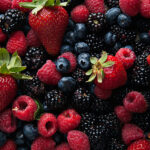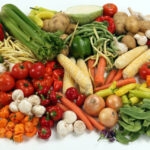Food of the Month
Vinegar: More than pucker power
Several research findings over the last decade have shown that having a realistic amount of vinegar or lemon juice in the form of a salad dressing with a mixed meal has significant blood glucose-lowering effects. In fact, as little as 4 teaspoons of vinegar in a vinaigrette dressing (4 teaspoons vinegar + 2 teaspoons oil) with an average meal lowered blood glucose by as much as 30%. We know from our own GI Group research shows that lemon juice is just as powerful. ‘The effect appears to be related to the acidity,’ says Prof Jennie Brand-Miller ‘because some other organic acids (like lactic acid and propionic acid) also have a blood glucose-lowering effect, but the degree of reduction varies with the type of acid.’ How does it do it? Essentially, the acidity puts the brake on stomach emptying, slowing the delivery of food to the small intestine. Digestion of the carbohydrate in the food is therefore slowed and the final result is that blood-glucose levels are significantly lower. Animal studies are also showing that acid may increase the storage of glycogen (the form that blood glucose is stored for future energy needs) in the skeletal muscles and liver, providing fuel for later use.
![[VINEGAR]](https://glycemicindex.com/blog/2008/february08/vinegar250.jpg)
According to a small preliminary study recently published in Diabetes Care (2007; 30 (11): 2814-2815) downing a couple of tablespoons of apple cider vinegar before bed may help to reduce high fasting blood glucose levels the following morning, in people with type 2 diabetes. Researchers from Arizona State University, gave 11 people with type 2 diabetes, 2 tablespoons of apple cider vinegar as a late night snack with cheese and compared the results with a pre-bed cheese and water snack. They found a small average reduction of 0.26 mmol/L (a 4% decrease) in fasting blood glucose levels with the cheese and vinegar snack compared to a 0.15 mmol/L (2%) reduction for cheese and water. ‘Finding ways to help those with type 2 diabetes maintain acceptable blood glucose through foods and diet patterns is far more appealing for many to manage their condition,’ said Dr Carol Johnston, Department of Nutrition chair. ‘Vinegar is widely available, it is affordable, and it is appealing as a remedy, but much more work is required to determine whether vinegar is a useful adjunct therapy for individuals with diabetes,’ the researchers conclude.
Swedish researchers from Lund University have found another benefit of pucker power – vinegar may also help dieters eat less and reduce cravings brought on by sugar spikes after meals. The more vinegar consumed (up to 2–3 tablespoons before a meal), the more satisfied people felt.
‘I have read that the only benefits to be derived from vinegar are if it is “mother vinegar” or raw and unprocessed. Do apple cider vinegar and red wine vinegar have the same effects? ‘
Yes they do. So will balsamic vinegar and white wine vinegar, lemon juice, lime juice, some salad dressings and even pickled vegetables.







